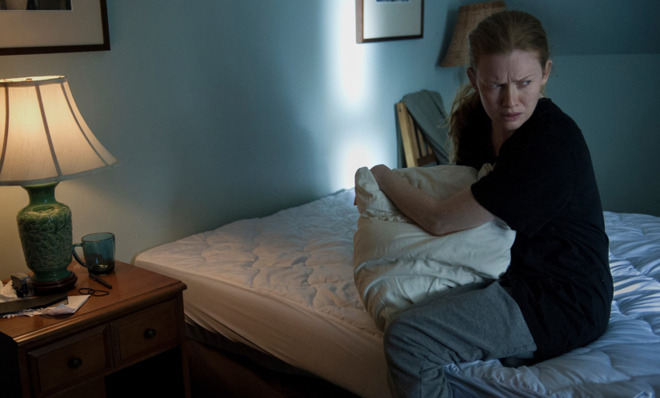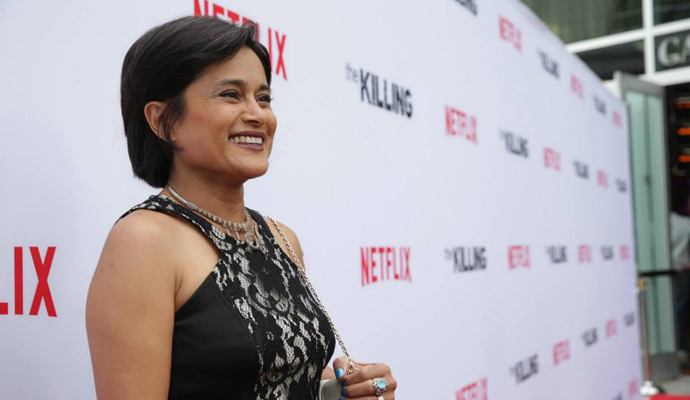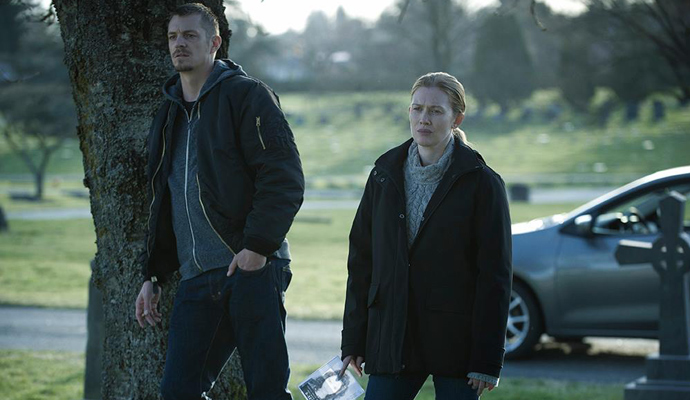How The Killing survived two cancellations and ended on its own terms
As the crime drama's final season premieres on Netflix, showrunner Veena Sud reflects on its fascinatingly fractured history


On Friday, gloomy crime drama The Killing will premiere its final block of episodes. If that sentence sounds familiar, you might be recalling the two other times that The Killing was canceled. This latest revival comes courtesy of Netflix, which plans to release all six episodes of what the streaming service is billing "the final season." Of course, The Killing — which originally premiered on AMC in 2011 — didn't begin life as a Netflix original series; it merely evolved into one, falling into the lap of a company hungry for original content.
In a recent interview with The Week, showrunner Veena Sud expressed her excitement about ending the series on her own terms. "After coming back from the dead twice, it absolutely feels like a victory lap," she said. "Not only were we able to come back twice, but this final season is how I wanted to end the story of Sarah Linden from the very beginning."
The Killing's production history is as convoluted and full of twists as its narrative. It came on the heels of AMC's back-to-back critical juggernauts, Mad Men and Breaking Bad, as well as the channel's biggest commercial smash, The Walking Dead. It came just before a wave of prestigious serialized crime dramas that include The Fall, Broadchurch, and True Detective. It was one of the first TV shows to drum up popularity by making its pilot available for free online, and it attracted scads of feverish, obsessive weekly recaps from those who wanted to figure out who had killed Rosie Larsen.
The Week
Escape your echo chamber. Get the facts behind the news, plus analysis from multiple perspectives.

Sign up for The Week's Free Newsletters
From our morning news briefing to a weekly Good News Newsletter, get the best of The Week delivered directly to your inbox.
From our morning news briefing to a weekly Good News Newsletter, get the best of The Week delivered directly to your inbox.
The Killing — like ABC's Lost, which aired its widely reviled series finale within a year of The Killing's premiere — became one of the early poster children for the pitfalls of internet buzz. Critics embraced The Killing in its early days, but skepticism grew as the first season dragged its feet. When the season ended without revealing the killer, the collective reaction was swift and brutal. Though the solution was offered by the end of season two, 20 percent of season one's audience had already tuned out, and the series was canceled.

But something unexpected happened: The series received an unlikely lifeline from Netflix, which struck a deal to cofund a third season in exchange for exclusive streaming rights. AMC canceled The Killing for a second time after its third season came to an end — but Netflix swooped in to save it again, picking it up for the final season that will premiere on Friday.
Why did Netflix step in to save The Killing on two separate occasions? As always, the company is maddeningly opaque about its viewership numbers — but it's safe to assume that despite the show's flaws, Netflix is impressed enough by The Killing's streaming numbers that it is viewed as an asset. The story now has a definitive beginning, middle, and end, which American viewers can discover all at once — exclusively on Netflix, of course. Consequently, the series can continue to attract new eyeballs in perpetuity.
The Killing's impending afterlife on Netflix raises intriguing questions. The rage over the first season was primarily directed at a meandering, slow-to-unfold story. Will that problem be mitigated on Netflix, where binge-watching is the norm and pacing problems can seem less glaring?
A free daily email with the biggest news stories of the day – and the best features from TheWeek.com
I asked Veena Sud for her thoughts on The Killing's ultimate legacy, which will likely be defined by its association with Netflix. "I'm very excited about that," she said. "I hear about that anecdotally from friends of friends, that people are coming to The Killing because they're hearing about it on Netflix and doing that — knocking it out in a week or two. […] To not have the handicap of annoying commercials breaking your concentration, and having to sit around and wait for a week to pick up a very intense story, is great. It's like reading a very thick, intense novel. You don't want to read a chapter, wait a week, read another chapter. You have to keep going to experience it. And I watch everything like that now. There's no other way to watch."
The Killing's fourth season picks up immediately after the third season's cliffhanger, as Sarah Linden (Mireille Enos) and Stephen Holder (Joel Kinnaman) attempt to cover up a murder — a twist that seemed like it might never be resolved, before Netflix arrived to save the day. ("It would have been a very odd way to end the series, and I think very unsatisfying," conceded Sud.) The fourth season also offers a new case to be solved: The murder of an entire family in their home, with all clues seeming to point at their teenaged son.

According to Sud, the new case is a conscious echo of Truman Capote's legendary true-crime book In Cold Blood. "I've always been fascinated by this notion of a home that is invaded in the middle of the night, and is absent of a family in the most violent way," she explains. "What that house looks like, what that house feels like for anyone who walks into it. The notion of a haunted house, the notion of a house in which violence has occurred."
The Killing's final season consists of just six hourlong episodes — a relatively short amount of time to wrap up all those dangling threads. Given The Killing's unrivaled ability to cheat death, I had to ask Sud: Is The Killing really over this time?
She laughed. "The way we end the season, there is no season five. This is the end of the story. And this is the way I wanted to end it from the very beginning. Unless someone else wants to come and make some other stuff, this is really the end of the story of Linden and Holder."
But say, hypothetically, that Netflix came knocking with an offer to keep The Killing alive for a fifth season. Would she really turn Netflix down? "Of course I'd be interested — but in doing justice to the story, I had to end it," she says. "Every story has to end. Every character...you have to close the book on them at some point."
Scott Meslow is the entertainment editor for TheWeek.com. He has written about film and television at publications including The Atlantic, POLITICO Magazine, and Vulture.
-
 How Mississippi moved from the bottom to the top in education
How Mississippi moved from the bottom to the top in educationIn the Spotlight All eyes are on the Magnolia State
-
 Why Greenland’s natural resources are nearly impossible to mine
Why Greenland’s natural resources are nearly impossible to mineThe Explainer The country’s natural landscape makes the task extremely difficult
-
 The Week contest: Post-surgery Spanish
The Week contest: Post-surgery SpanishPuzzles and Quizzes
